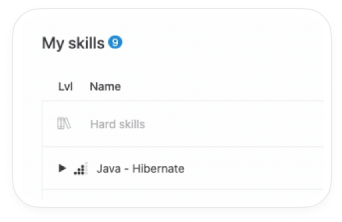Does the future of recruiting depend on new technologies? Hiring methods have changed along with technological development, the emergence of social networks, and changes in online behavior.
Technologies like artificial intelligence (AI) and machine learning are shaping the future of work, and the only thing we can do is accept progress. But what does it mean for a recruiter of the future?
Most future professions will be tech-related, but they’ll require excellent emotional intelligence and critical thinking. Therefore, it’s crucial to evolve and gain new recruiter skills and competencies to stay relevant today and tomorrow.
Role of recruiters in the future of HR
Frédéric Mazzella, the founder of BlaBlaCar, once said, “My father had one job in his life, I’ve had six in mine, and my kids will have six at the same time.” This quote describes changes in working conditions and the active move to the gig economy. We’re moving from the necessity to visit the office at one job to the opportunity to work on several projects simultaneously for different companies.
Many variables shape our workplace, from technological development and diversity, equity and inclusion (DEI) practices to finding a balance between data collection and employee trust. The future of recruiting depends on the biggest trends in work life. Let’s consider what challenges will impact the development of recruiter skills and competencies.
According to a Deloitte study about rules for the digital age, 41% of HR leaders say they’ve implemented or started learning more about AI technologies that can eliminate the human factor and unconscious bias.
Following Deloitte’s footsteps, Sage shares polls showing that 24% of businesses started using AI for their talent acquisition needs, and 56% of managers plan to adopt automated technology in the next 12 months. GlobalData even predicts that the market for AI platforms will reach $52 billion by 2024, compared to $29 billion in 2020.
Josh Bersin, a global industry analyst, also claims that the development of flexible, state-of-the-art integrated recruitment technology is now the key to success. To improve recruiter performance over the next five years, LinkedIn invests in new recruiting technology. While technology won’t replace recruiters, it can augment their skills and reduce busywork, allowing them to focus on engaging candidates and developing your talent strategy.
So be ready to practice different skills throughout your career. Instead of asking yourself, “Will I lose my job because of automation?” keep a broader mindset and think about how you can use automation tools and software to optimize your work. Let’s move on to a more specific consideration of skills and competencies for the recruiter that are relevant today and will remain relevant in the future.
Find out how future-oriented you and your HR team are
Future readiness and the ability to think outside the box are key indicators of the potential of an HR specialist to solve future tasks. Take a quick quiz and find out if you and your team have the same future-oriented skills and practices.
Skills of the future-oriented recruiter
Changes in the future of work will lead to shifts in skills required of recruiters. Here are the skills and competencies of a recruiter you should develop to make sure you’re moving in the right way professionally.
Hard skills
Let’s talk in detail about recruiters’ hard and technical skills and competencies according to data we’ve collected through HRForecast AI tools and technologies.
Use of web-based technologies, job portals, and social media for recruiting activities
The recruitment process has changed significantly over the past few years, from advertising vacancies on social networking sites to use online application forms and software to select candidates.
The use of software to select suitable candidates is a boon for HR professionals tasked with analyzing numerous applications for limited positions. Some companies also succeed through transparent procedures like simple online applications on job portals and fixed reviews that include feedback from candidates.
Advanced knowledge and work with management tools like ATS
Finding sources has become one of the most critical talent acquisition skills today. On average, 75% of applicants are unqualified, so it’s essential to have an applicant tracking system (ATS) and tools.
Whether you provide passive candidate search, strategic search, or basic search through the ATS, it’s essential to know what experience your candidates have in this area. The ability to work with such tracking systems is a big plus.
An applicant tracking system is mandatory in the fast-growing labor market to go beyond traditional recruitment methods such as using spreadsheets and email chains to manage the hiring process.
Gamification techniques for recruiting
Gamification usually includes game mechanics, design, and theories to engage and motivate people to achieve their goals digitally and feel freer when working. Professor Allen Huffcutt from the University of Wisconsin has identified that candidates have already heard frequent interview questions and come prepared with script answers that show little of their qualifications.
Gamification can help. Matt Jeffrey, SAP vice president and global head of a sourcing and employment brand, shares that gamification adds a fun element to a typically tedious recruitment process with the help of quizzes, practical tasks, or behavioral assessment tests. These practices allow recruiters to assess a candidate’s creative thinking and problem-solving skills. This type of hiring is gradually gaining popularity, so try gamification as a new skill for you.
Knowledge and application of different interview techniques
Interviewing remains one of the recruiter’s skills and competencies you think you know only because we’ve been doing it for so long that it’s a matter of habit.
However, interviews often have an atmosphere of urgency or tension. And it doesn’t help the candidate open. A candidate should be comfortable communicating with you because, by ignoring this, you can lose valuable talent. Therefore, among the key requirements is finding out what type of interview would be more convenient for the candidate: a physical meeting somewhere or an online call (which leads to the use of convenient video conferencing tools).
Storytelling and employer branding knowledge
Companies are guided by their mission and values, but stories make them real to candidates. Storytelling is not just a trend; it’s a necessary skill for everyone who works with people. Creating your company’s image with the help of storytelling makes that image clear for a candidate and makes your company a desirable place to work. Your ability to create exciting content helps you attract and find the best talent (but please, without bigotry).
Strategic thinking and business acumen
Business acumen is a recruiter’s ability to understand different business scenarios and deal with them effectively. HR managers with strong business acumen can better understand business issues, adapt and remain flexible in the face of change, understand business operations, and ensure business success.
Strategic thinking is another crucial skill and competency for a recruiter. It refers to a person’s ability to develop effective plans to address business situations and create strategies to achieve company goals. Thus, you as a recruiter can quickly adapt to new changes and stay flexible in developing a strategic action plan (which is critical due to the frequency of talent market changes).
Talent sourcing and OSINT techniques
Recruiters typically use Google or LinkedIn to explore the experience, skills, and even character of candidates. However, for some reason, they often bypass the OSINT investigation method.
OSINT, or Open-Source Intelligence, helps recruiters explore, automate, and customize the hiring process with specialized tools to gain information on previous work and academic experience, industry status, interests, etc.
Following this method could mean searching Google for a candidate’s full name or email address in its simplest form. Of course, this is something that many recruiters already do intuitively as part of data verification when selecting candidates, but isn’t it better when you can automate this process?
Automate the talent search inside and outside the company
See how smartPeople helps you identify skills gaps, transform your skills landscape, find the best locations for your operations, and create the best fit between your employees’ skills and your business requirements.
Soft skills
Soft skills are crucial, helping employees solve complex problems without a flinch. The skills below are based on our global job postings analysis and depict current labor market trends for the skills relevant to the future recruiter.
Planning and organizational skills
Organizational skills help HR managers develop critical thinking, leadership, and other skills. Recruiters with strong organizational skills are essential to the business’s successful operation and ensure operational efficiency. You need these skills in the workplace to increase productivity and be flexible in achieving your company’s goals (now and in the future).
Communication skills
“Oh no, not this communication again, it’s so obvious!” you say. And yet it remains one of the essential skills and competencies for the recruiter. You need to write compelling posts about work and social media and correspond with candidates and hiring managers by email, phone, and in person. You are the face of the company for candidates and the liaison between the two parties throughout the recruitment process.
In the US, 28% of employees say that poor communication can cost your company more than $400,000 a year. Recruiters with excellent communication skills improve the candidates’ experience because candidates feel heard and respected.
Networking skills
Networking skills are interconnected with the previous because networking works great with developed communication abilities. Recruitment involves meeting and interacting with as many qualified people as possible to build relationships that can lead to successful hiring. Therefore, online communication is an invaluable skill for recruiters and will stay so in the future. In addition, networking helps recruiters build contacts in the industry and meet potential candidates.
Attention to detail
Attention to detail is one of the skills that recruiters value most. The Attention to Detail survey shares that this skill increases productivity, employee morale, and customer service. People who focus on details are successful in the workplace because it allows them to do quality work and manage their time efficiently. Attention to detail is crucial for recruiters because it optimizes performance, saving time and resources for the organization.
Team player attitude
A good attitude to teamwork helps professionals reject their prejudices, mistrust, pride, and fear of becoming part of a larger whole. The transition from “me” to “we” (from “us and them” to only “us”) is not natural for everyone. Teamwork and transparency about skills and competencies are essential components for a recruiter. When you know what the company and its employees are interested in developing, you can find solutions to reduce turnover or absenteeism and increase retention.
How does skill development pay off?
Developing your recruiting skills and competencies improves your job satisfaction and working experience, leading to more passionate and exciting work. Developing your skills can advance your career in several ways:
- Get a raise. Since 2020, new skills have increased by 15%. Therefore, gaining and developing new skills is one of the best ways to increase your value to your employer.
- Make your work-life more enjoyable. Learning something new is a great way to take a fresh look at your current state and what you’d like to update or develop. In addition, your new skills can make you more productive in your work.
- Develop personally. Finally, advanced training is excellent for your personal development. You can continue to improve by constantly learning something new.
Learn more about how you can upskill and reskill yourself as a recruiter with the help of practical and up-to-date tools from HRForecast. Let’s talk!
Stay up to date with our newsletter
Every month, we’ll send you a curated newsletter with our updates and the latest industry news.




























 info@hrforecast.de
info@hrforecast.de
 +49 89 215384810
+49 89 215384810






